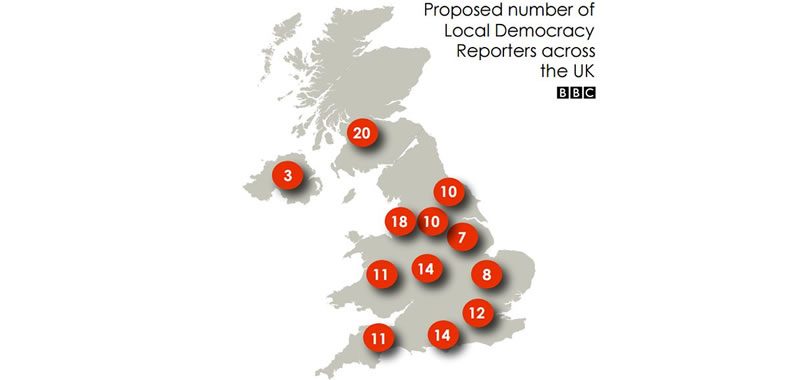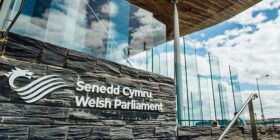BBC Licence Fee Payers To Subsidise Local Media Retreat

The BBC has formally announced its ‘Local Democracy Reporter’ project, which will see BBC fund contracts via external media companies to run reporters covering old school things like local council meetings.
The plans have been mooted for a while, with various trials conducted last year including in Wrexham. Many believe the BBC have taken this action to help strengthen their recent Royal Charter renewal, with the BBC saying the project “will help support local news generally and build a better understanding of local democracy”.
The likes of Wrexham.com, or MyWelshpool.co.uk (but not smaller operations like Deeside.com), could ‘bid’ to run the contracts of a group of BBC funded reporters with the output then shared with a pool of other publications – likely the BBC, the Leader and Daily Post locally.
The position would be paid for by the BBC but the reporter themselves would be working for a host organisation. Others would be able to access the reports produced at the same time, for free.
A ‘Shared Data Hub’ is also being created with the output of that being shared locally across the UK. Trinity Mirror has a similar ‘data unit’ where, for example, they will do the same FOI to all police forces and then produce local data sets for their local information – sometimes with a UK wide context.
Locally we were aware of the BBC ‘Local Democracy Reporter’ via our work with the C4CJ at Cardiff University, and have lightly fed back our thoughts. We first spotted the trial taking place when we saw the BBC covering an obscure-ish Wrexham Council meeting – a rarity itself let alone on a minor topic.
Generally taxi licensing meetings get zero attendees from the media, scrutiny (such as yesterday) usually has Wrexham.com and at times the Leader also there – with the Executive Board usually having both ourselves and the Leader. It is very rare to see the Daily Post in Council meetings anymore, likewise the BBC is unicorn-esque in Wrexham Council chambers.
Media groups argue there is not enough resources and there is not much commercial value in spending a few hours documenting council stuff, as you the reader prefer other ‘content’. Such decisions are made by people in the media organisations, for example someone in Trinity Mirror decides that such local meetings are not a priority. In November when the Coca-Cola Truck brought its sugary festive spirit to town, two Daily Post reporters were dispatched byTrinity Mirror and were on site at Queens Square through the afternoon and into the evening for a several hour Live Blog.
Under the new scheme the BBC will fund any such council coverage shortfalls, allowing both the coke truck tasks to be covered alongside the council coverage from the ‘Local Democracy Reporter’, without it costing a penny more.
Locally during the project trial we attended meetings where the Leader would have usually covered it (the iPad upgrade councillors controversy!) not attended by that publication, however the BBC report was printed by them.
We raised this issue in feedback, as the project is specifically not meant to mean local reporters are done out of jobs or there is reduced coverage. It will be interesting to see as this rolls out if the people of Wrexham benefit from an extra pair of eyes, or if the real benefit will be a shifting of wage bills from media companies to the BBC – and in turn the tax payer.
In the BBC explainer article under the title “Why is it being introduced?” the first two paragraphs talk about falling print readerships and advertising revenues in local papers. Such commentary will not do much to dampen the speculation we have encountered that see this as an effective subsidy to such media organisations, allowing them some effectively free local reporting.
There has also been criticism that the deployment of the new Local Democracy Reporter areas have a coincidental rough match to existing patches covered by regional news groups – although the BBC do say ‘we have allocated them according to top-tier local authority area’. Here in North Wales we will see just three roles created, with Cardiff and Newport alone getting that each, and South Wales getting 72% of the resources.

Previously various industry representatives have voiced concerns that the BBC are ‘intruding’ on local and regional media territory, one describing it as ‘BBC imperialism through the back door’. Concern was also raised about the anti-competitive nature of the BBC putting another workforce in ‘their’ areas. Today the same people have said the project will ‘enhance democracy’ and ‘improve competition’, despite there being very little difference between the proposals and the plan announced.
138 jobs are set to be created under the taxpayer funded scheme and a phased roll out is due through this year and into next, with the initial plan to have them in place before the elections in May apparently scrapped.
For the record we did not use any of the BBC reporter coverage during the trial, but were provided access to it. We will apply to get access to the ‘news bank’ for the area when launched. We will not apply for a reporter contract bundle or sub-bundle. The ethos of the project is to have more eyeballs on the workings of local democracy – not less – and hope that our reports on meetings give readers choice in coverage.
Spotted something? Got a story? Email [email protected]












